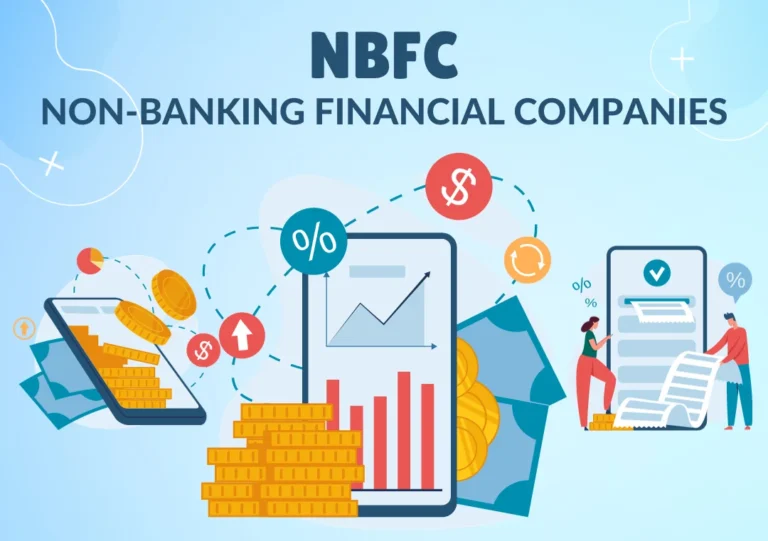A Non-Banking Financial Institution (NBFC) is a type of financial institution that provides banking services without meeting the legal definition of a bank. NBFCs play a crucial role in the financial system by offering various financial services and products to individuals and businesses. Here’s an overview of NBFCs, their functions, regulations, and significance:
Functions of NBFCs
1. Credit Intermediation
- NBFCs provide loans and credit facilities to individuals and businesses, including personal loans, vehicle loans, SME loans, and consumer finance.
2. Investment Activities
- They engage in investment activities such as investing in stocks, bonds, debentures, mutual funds, and other securities.
- Some NBFCs specialize in providing investment advisory services.
3. Asset Financing
- NBFCs offer asset financing for purchasing vehicles, equipment, machinery, and other capital assets through lease or hire-purchase arrangements.
4. Wealth Management
- They provide wealth management services, including portfolio management, financial planning, and investment advisory services.
5. Microfinance
- Some NBFCs specialize in microfinance, providing small loans and financial services to low-income individuals and micro-enterprises.
6. Forex Services
- NBFCs facilitate foreign exchange services, including currency exchange, remittances, and forex trading.
Regulations Governing NBFCs
1. Registration and Regulation
- NBFCs are regulated by the Reserve Bank of India (RBI) under the provisions of the Reserve Bank of India Act, 1934.
- They must obtain a Certificate of Registration (CoR) from the RBI to operate as an NBFC.
2. Prudential Norms
- NBFCs are required to comply with prudential norms prescribed by the RBI, including capital adequacy norms, liquidity requirements, and asset classification and provisioning norms.
3. Reporting and Disclosure Requirements
- NBFCs must submit periodic reports, financial statements, and other disclosures to the RBI.
- They are subject to regulatory inspections and audits by the RBI to ensure compliance with regulatory requirements.
4. Corporate Governance
- NBFCs must adhere to corporate governance guidelines issued by the RBI, including board composition, risk management practices, and internal control mechanisms.
5. Customer Protection
- NBFCs are required to adhere to fair practices code and customer grievance redressal mechanisms to protect the interests of their customers.
Significance of NBFCs
1. Financial Inclusion
- NBFCs play a crucial role in extending financial services to underserved and unbanked segments of the population, promoting financial inclusion.
2. Diversification of Financial Services
- They complement traditional banking services by offering specialized financial products and services tailored to specific customer needs.
3. Support for Small Businesses
- NBFCs provide vital funding support to small and medium enterprises (SMEs) and micro-enterprises, fostering entrepreneurship and economic growth.
4. Liquidity Management
- NBFCs contribute to liquidity management in the financial system by mobilizing funds from the public and channeling them into productive investments.
5. Market Stability
- They enhance the resilience and stability of the financial system by diversifying sources of funding and credit intermediation.
Types of NBFCs
- Asset Finance Company (AFC): Focuses on financing of physical assets such as automobiles, construction equipment, etc.
- Loan Company (LC): Provides loans and advances, but cannot accept deposits.
- Investment Company (IC): Primarily deals with investments in securities.
- Microfinance Institution (MFI): Provides microfinance services to low-income individuals and micro-enterprises.
- Infrastructure Finance Company (IFC): Specializes in financing infrastructure projects.
NBFCs play a pivotal role in the financial ecosystem by providing diverse financial services and catering to the financial needs of various sectors and segments of society. They are regulated entities that contribute to financial inclusion, economic growth, and market stability while complementing the services offered by traditional banks. Understanding their functions, regulations, and significance is essential for stakeholders in the financial sector and economy at large.
At Ujjwal Gupta & Co
We, at Ujjwal Gupta & Co, are dedicated to delivering personalized, high-quality solutions tailored to meet your financial and business needs. With our team of professionals and a client-first approach, we ensure that every challenge is met with expert guidance and strategic insight.
We are dedicated to ensuring your business’s success by providing best service practice available in the industry and that too at a cost effective pricing. Our team of experts is excited to work with you and provide the support you need to thrive in the Indian business landscape.
Our only motive is to create Value for Our Clients and accordingly, have a Client Value System at our Office.
So, let us help you navigate the complexities of finance and compliance, empowering you to focus on what matters most — growing your business. Get in touch today, and take the first step towards financial peace of mind.
An NBFC (Non-Banking Financial Company) is a financial institution that provides banking services without meeting the legal definition of a bank. It is regulated by the Reserve Bank of India (RBI) under the RBI Act, 1934 and primarily engages in activities such as loans, credit facilities, investment, and asset financing.
Key differences between NBFCs and banks include:
- NBFCs cannot accept demand deposits (e.g., savings/current accounts).
- NBFCs do not form part of the payment and settlement system.
- NBFCs cannot issue cheques drawn on themselves.
- Banks can provide banking services like deposit accounts and overdrafts, which NBFCs cannot.
NBFCs in India are classified into various categories based on their activities, including:
- Asset Finance Companies (AFCs)
- Investment Companies (ICs)
- Loan Companies (LCs)
- Infrastructure Finance Companies (IFCs)
- Microfinance Institutions (MFIs)
- Housing Finance Companies (HFCs)
- NBFC-Factor (engaged in factoring activities).
To register as an NBFC in India, a company must:
- Be incorporated under the Companies Act, 2013.
- Have a minimum net owned fund (NOF) of ₹2 crores (₹5 crores for NBFC-P2P platforms).
- Submit an application to the RBI along with required documents and meet eligibility criteria.
NBFCs can engage in activities such as:
- Granting loans and advances.
- Acquiring stocks, bonds, and other securities.
- Asset leasing and hire purchase.
- Insurance services (through subsidiaries).
- Microfinance and housing finance.
However, they cannot accept demand deposits or issue cheques like banks.
NBFCs must adhere to several compliance requirements, including:
- Maintaining a minimum capital adequacy ratio (CAR).
- Submitting periodic returns and audited financial statements to the RBI.
- Conducting statutory audits and maintaining proper books of accounts.
- Following fair practice codes and ensuring customer protection.
- Adhering to anti-money laundering (AML) and KYC norms.
NBFCs play a crucial role in:
- Providing credit to underserved and unbanked sectors.
- Promoting financial inclusion by offering microfinance services.
- Supporting small businesses, entrepreneurs, and individuals with flexible loan products.
- Contributing to infrastructure financing and economic growth.
Common challenges include:
- Access to capital and liquidity constraints.
- Regulatory compliance burden.
- Competition from banks and fintech companies.
- Rising non-performing assets (NPAs) and loan defaults.
- Dependence on wholesale funding, which is sensitive to market fluctuations.
NBFCs are regulated by the Reserve Bank of India (RBI) under the RBI Act, 1934 and relevant provisions of the Companies Act, 2013. Some NBFCs, like Housing Finance Companies (HFCs), are regulated by sector-specific regulators such as the National Housing Bank (NHB).
- Deposit-Taking NBFCs (NBFC-D): These can accept time deposits from the public (with RBI approval).
- Non-Deposit-Taking NBFCs (NBFC-ND): These cannot accept public deposits and rely on other funding sources like equity, bonds, or bank loans.
Why Choose UGC?

Client Centric Approach
Client is the key driver of our service offerings. Our approach to service offerings is based on a client centric and customized approach. Our specialized teams are a mix of technical and industry experience in order to serve clientele for their specific needs.

Team Work
We have built high performing teams supported by strong work ethic. Our team is a mix of experts, professionals and support staff from technical and varied academic, social and ethnic backgrounds. We believe diversification plays a vital role in motivating the team.

Quick Turnaround
We always endeavour for a quick turnaround time to serve our clientele. We are supported by an experienced and client focussed support teams to offer timely services to our clientele. In case of any business exigencies and time sensitive service requirements, you can always count on us.

Open Communications
We believe that open communication is the core principle in order to demonstrate trust, build long lasting and valuable relationships with clientele. We are committed to ensuring transparency in communication, service offerings and delivery. Our only motive is to provide professional services to our clients.

Client Value System
We value for the Client time and thus, we offer services that are value for money. Quality professional services are provided to our clients, so that they are able to achieve their desired results. We are a quality trademark in the industry and thus, our clients count on us always.

Quality in Delivering Work
Our service offerings are driven by quality and reviews at every level. We strive to provide a qualitative and value-added delivery to our clientele. At all times, we endeavour to provide exceptional client service by meeting client expectations and driving client satisfaction.















